'Fewer small abattoirs means more factory farms'
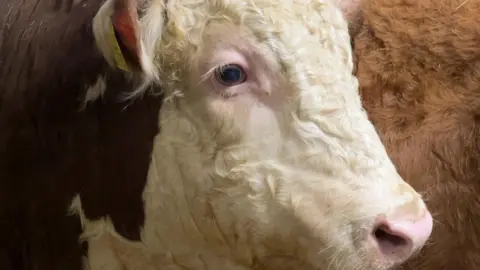 BBC
BBCFarmers say they are concerned about the future viability of their businesses following the closure of a smaller abattoir.
Newman's in Farnborough, Hampshire, slaughtered most of the livestock reared on the Isle of Wight, before it was returned to the island for sale locally.
The independent family business, which opened in the 1950s, is the latest of several smaller and medium-sized abattoirs to shut in recent years.
The government says it is committed to working with the meat-processing sector to tackle the challenges it faces.
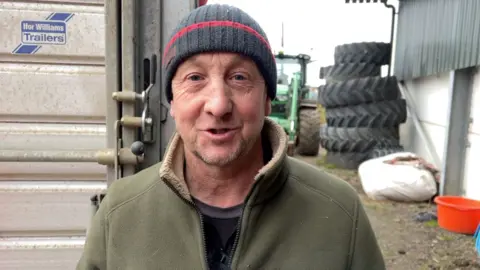
Beef farmer Richard Salter sells most of his meat to butchers, farm shops and wholesalers on the island.
"With the smaller abattoirs we get more of a personal feel with the livestock. They treat the animal to our needs so we know exactly how they're going to come back," he says.
Fellow sheep and beef farmer Angus Baird agrees: "That's why small abattoirs have got to be about because the big ones are usually tied up with supermarkets and they wouldn't want to do this.
"It's nice to have Isle of Wight produce back here. People like local meat now."
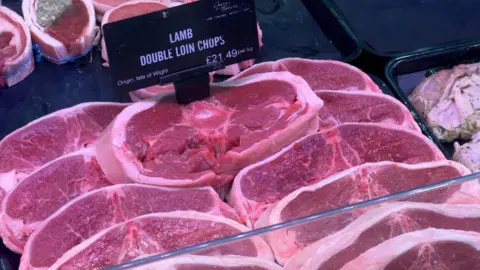
Angus' lamb is on sale just a couple of miles away from his farm at Harvey Brown's butchery and food hall.
"Small abattoirs and local livestock farmers producing high quality, high welfare animals are an important part of our supply chain," says owner Ben Brown, adding: "Without the small abattoirs, we will start to move closer to generic factory farms."
He continues: "This would change not only the quality of the food we eat but the look and feel of the countryside.
"The Isle of Wight's natural beauty is reliant on the farmed environment."
The abattoir landscape has changed considerably over the past 50 years. There were about 2,500 in the UK in the 1970s but just 203 by 2023.
In recent years the number of smaller ones operating in England fell from 64 in 2019 to 49 in 2023, and five more facilities, like Newman's, closed last year.
Newman's says its closure is due to an "unworkable relationship with the Food Standards Agency and unreliable staff".
The National Farmers' Union (NFU) says general reasons for closures include a "lack of labour availability, lack of available investment on infrastructure due to thin margins, increasing costs from waste disposal and red tape".
The Food Standards Agency says smaller abattoirs are closing at the rate of 10% a year, leading to concerns that they may disappear within a decade.
According to the Department for Environment, Food and Rural Affairs (Defra), a smaller abattoir is one that processes up to a 10,000 cows, sheep, goats or pigs per annum or 500,000 birds.
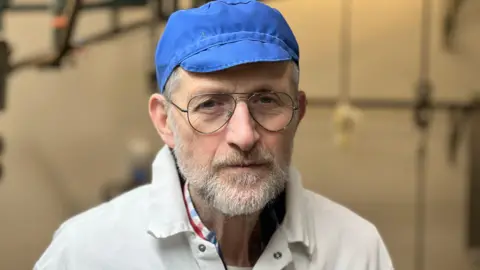
Farmers on the Isle of Wight now send animals to C&S Meats near Sherborne, Dorset, but it cannot deliver back to the island.
Isle of Wight Council stepped in, paying £20,000 towards the cost of a new lorry which farmer and haulier Richard Salter and his staff will operate.
"Trying to find an abattoir that would meet our needs has been difficult because all the small ones are closing down," he says.
"But they specialise in providing meat for farm shops and butchers.
"We like to see Isle of Wight produce come back to the island, not to the big supermarkets."
But the owner of C&S Meats, Charlie Goodland, is not optimistic for the future of his business.
"It's the upkeep, the costs, the vets, meat inspectors," he says.
"It costs a lot money. It's gone through the roof."
He has been slaughtering all his life and has run his own abattoir for 23 years, providing a vital service to smaller farmers or people with just one or two animals.
"Say it was you who had a sheep, a pig or a cow. You would rather go with your animal to the abattoir and see it go through and done wouldn't you? I don't know what will happen if I go. They'll have nowhere to go," he says.
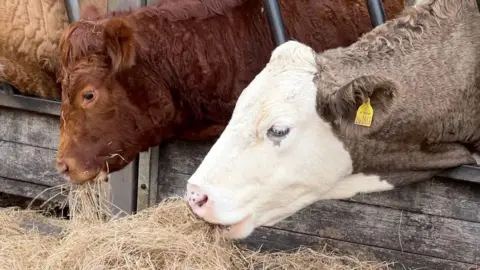
A survey of 545 livestock farmers in the South East by the National Farmers Union found more than half had to charge more for their products due to smaller abattoirs closing.
Half said they would either have to reduce their stock levels, stop keeping livestock or cease trading if more shut.
Robyn Munt, county chair of the National Farmers' Union on the Isle of Wight, said: "It's a real worry for us as farmers need access to that integral part of the system.
"The big abattoirs deal with a uniform carcass ending up in supermarkets, it is very important, but you also do need the medium and small abattoirs that are servicing that local business network."
The last government launched a Smaller Abattoir Fund in 2023, making £4m available in capital grants. But Labour has not committed to continuing that.
A spokesperson for Defra said: "We recognise that small abattoirs make a vital contribution towards maintaining our resilient food supply chain and provide a competitive route to market for producers of rare and native breeds.
"We have committed £5bn to the farming budget over two years, including more money than ever for sustainable food production, alongside our New Deal for Farmers to deliver a profitable farming sector and unlock rural growth."
You can follow BBC Hampshire & Isle of Wight on Facebook, X, or Instagram.
